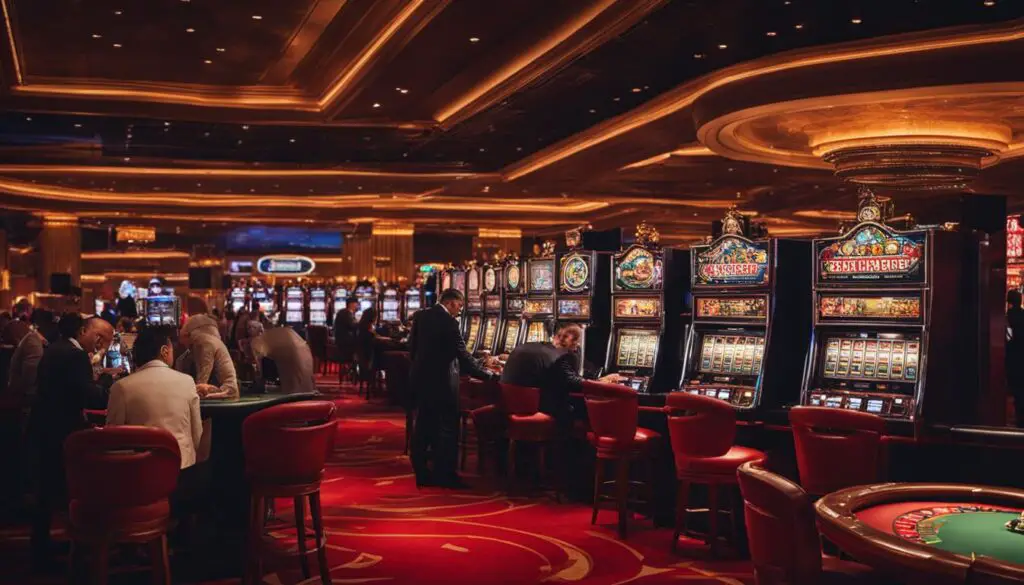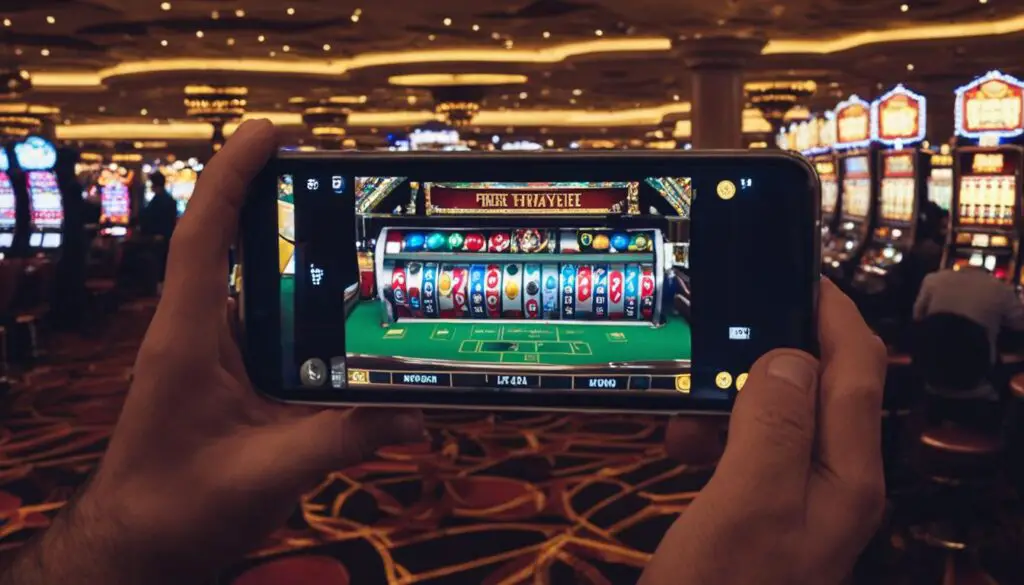In recent years, the practice of phone tapping in casinos has sparked controversy and raised questions about privacy and security. Many wonder why casinos engage in this activity and how it impacts players and the industry as a whole. To shed light on this issue, we delve into the motivations behind phone tapping and its implications for safety and fair play.
Key Takeaways:
- Casinos tap phones to enhance surveillance and detect suspicious activities.
- Phone tapping helps prevent cheating and mitigate risks associated with money laundering and criminal activities in casinos.
- Privacy concerns have led to regulations that dictate the proper use of phone tapping in casinos.
- It is crucial for casinos to find a balance between security and privacy when implementing phone tapping policies.
- Transparency, proper training, and adherence to regulations are crucial for maintaining public trust.
The Need for Enhanced Surveillance
Casinos prioritize the safety and security of their premises, which is why they have a strong need for enhanced surveillance measures. These measures are designed to create a safe and secure environment for both players and staff. One of the methods utilized by casinos to monitor activities and identify potential threats is phone tapping. This surveillance technique allows casinos to detect suspicious behavior, prevent cheating, and mitigate risks associated with money laundering and other criminal activities.
By implementing a phone tapping policy, casinos can stay one step ahead of individuals who may attempt to compromise the integrity of the gaming experience. This procedure is in line with the industry’s commitment to maintaining a fair and transparent environment for all patrons.
Enhanced surveillance, including phone tapping, provides casinos with invaluable insights into the activities taking place within their premises. By effectively monitoring communication channels, casinos can proactively identify and address any potential security threats, ensuring the safety and trustworthiness of the gaming experience for everyone involved.
Moreover, the use of phone tapping is not limited to casinos alone; it is a widely accepted practice in various industries to prevent illegal activities. Casino security is no different, as it is crucial for maintaining the integrity and reputation of the establishment.
Phone tapping serves as a vital tool in enhancing casino surveillance, as it allows for the identification of potential risks and the prompt implementation of necessary measures to maintain a secure environment.
Privacy Concerns and Regulations
While phone tapping in casinos is intended to enhance security, it also raises legitimate concerns about privacy. Many individuals question the legality and ethics of this practice, as it involves the monitoring of personal communication without explicit consent. As a result, regulations have been put in place to ensure that phone tapping is conducted within legal boundaries and with proper safeguards.
Casinos must comply with these regulations to protect the privacy of their patrons while still maintaining a secure environment. By striking the right balance between security and privacy, casinos can mitigate privacy concerns and establish a sense of trust with their customers.
It is important to note that illegal phone tapping in casinos is strictly prohibited and can have severe consequences for the individuals and establishments involved. Casino operators must adhere to the established regulations to prevent any breaches of privacy and maintain a responsible approach to phone tapping.
“Privacy is a fundamental right that should be respected in all aspects of life, including within the casino industry. While security is crucial, casinos must ensure that their surveillance activities are conducted in a lawful manner and with the utmost respect for privacy.”
Ensuring compliance with phone tapping regulations involves implementing comprehensive policies and procedures. These may include obtaining proper legal authorization, notifying individuals of the potential for phone tapping, and ensuring the secure handling and storage of intercepted information. By following these guidelines, casinos can navigate the delicate balance between security and privacy.
Regulations on Phone Tapping in Casinos
| Regulation | Key Points |
|---|---|
| 1. Privacy Laws | – Phone tapping must comply with applicable privacy laws and regulations to protect the rights of individuals. – Consent may be required from the individuals being monitored, depending on jurisdiction. |
| 2. Gaming Commission Regulations | – Gaming commissions often impose specific regulations on surveillance activities in casinos, including phone tapping. – Casinos must follow these regulations to maintain their licenses and operate legally. |
| 3. Industry Standards | – Professional associations and industry organizations provide guidelines on ethical surveillance practices. – These standards help regulate the use of phone tapping in a responsible and lawful manner. |
By adhering to these regulations and industry best practices, casinos can address privacy concerns and create an environment where patrons feel safe and protected. Open communication, transparency, and responsible handling of sensitive information are key in striking a balance between privacy and security in today’s modern casinos.

Balancing Security and Privacy
In the realm of casino phone surveillance, maintaining a delicate equilibrium between security and privacy is essential. While phone tapping provides crucial surveillance measures to identify and prevent illegal activities, it is equally vital for casinos to uphold the privacy rights of their patrons. This delicate balance requires the implementation of comprehensive security protocols and adherence to regulations.
To ensure privacy, casinos must provide proper training to their staff on handling and storing intercepted information. Transparency regarding the extent and purpose of phone tapping is also necessary to build trust with the patrons. By clearly communicating the reasons behind these surveillance measures, casinos can foster a sense of security without compromising individual privacy.
“Finding the right balance between security and privacy is crucial in the modern casino industry,” says Richard Thompson, a renowned security expert in the gaming sector. “Casinos must be proactive in implementing robust security measures while respecting the privacy concerns of their patrons. This requires maintaining transparency about the purpose and scope of phone tapping activities.”
Furthermore, adhering to regulations is a vital aspect in maintaining this equilibrium. Casinos must comply with legal boundaries and ensure that the process of phone tapping follows established protocols. This helps protect the privacy interests of patrons while keeping the operations of the casino secure.
To illustrate this balance, consider the following scenario:
| Casino Security Measures | Privacy Considerations |
|---|---|
| Implementing surveillance systems to monitor phone conversations and detect potential threats. | Ensuring proper consent is obtained from patrons regarding the monitoring of their phone calls. |
| Training casino staff on handling intercepted information and maintaining confidentiality. | Establishing strict protocols for handling and storing phone-tapped data to prevent unauthorized access. |
| Conducting regular audits and assessments to ensure compliance with privacy regulations. | Informing patrons about the purpose and extent of phone tapping activities. |

By striking a balance between security measures and privacy considerations, casinos can provide a safe and enjoyable environment for their patrons. This approach allows for a fair and transparent gaming experience while addressing concerns related to phone tapping in a thorough and responsible manner.
Conclusion
Phone tapping in casinos is a contentious issue that raises concerns about both privacy and security. While the practice is aimed at enhancing surveillance and preventing illicit activities, it is crucial for casinos to prioritize the privacy rights of their patrons and comply with regulations.
By maintaining transparency and implementing robust security measures, casinos can strike a balance between protecting their operations and ensuring a safe and enjoyable gaming environment. It is imperative for casinos to handle intercepted information responsibly and with utmost integrity.
Addressing the concerns surrounding phone tapping in casinos requires ongoing evaluation of policies and protocols. Casinos must work collaboratively with regulatory bodies to ensure that the privacy of their patrons is safeguarded while maintaining effective surveillance for the detection and prevention of illegal activities.
Ultimately, the objective is to create an environment where players can trust that their privacy is respected while still feeling secure and protected. By continuously improving security practices and adhering to regulations, casinos can foster a positive gaming experience for all patrons, providing peace of mind in an increasingly digital world.
FAQ
Why do casinos tap phones?
Casinos tap phones as part of their enhanced surveillance measures to maintain a safe and secure environment. Phone tapping helps detect suspicious behavior, prevent cheating, and mitigate risks associated with money laundering and criminal activities.
How does phone tapping enhance casino security?
Phone tapping allows casinos to monitor activities and identify potential threats. It is an effective tool for enhancing security by detecting and preventing illegal activities, ensuring fair play, and safeguarding the well-being of both players and staff.
What are the privacy concerns with phone tapping in casinos?
Phone tapping raises concerns about privacy as it involves the monitoring of personal communication without explicit consent. Many individuals question the legality and ethics of this practice, as it may infringe on their privacy rights.
Are there regulations in place for phone tapping in casinos?
Yes, there are regulations in place to ensure phone tapping is conducted within legal boundaries and with proper safeguards. Casinos must comply with these regulations to protect the privacy of their patrons while still maintaining a secure environment.
How do casinos balance security and privacy with phone tapping?
Casinos strive to find a balance between security and privacy by implementing comprehensive security measures, proper training, and protocols for handling intercepted information. They also prioritize transparency and adhere to regulations to address privacy concerns while ensuring the safety of their operations.
Source Links
- https://sitn.hms.harvard.edu/flash/2018/dopamine-smartphones-battle-time/
- https://www.brainfacts.org/neuroscience-in-society/tech-and-the-brain/2021/how-smartphones-hijack-the-brain-010821
- https://www.theguardian.com/technology/2018/may/08/social-media-copies-gambling-methods-to-create-psychological-cravings
